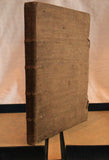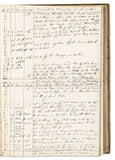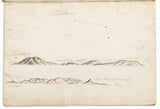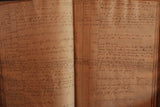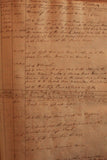Handwritten Logbook of HMS Mermaid, January 1, 1800-April 28, 1802.
Author: Robert Dudley Oliver ((1766-1850)
Year: 1800-1802
Publisher: Self published
Place: London
Description:
250 unnumbered pages of manuscript entries with drawings of elevations on free endleaves. Folio (12 3/4" x 9 1/4") bound in contemporary canvas, ties intact in a custom enclosure. original hand written logbook on hand-ruled laid paper.
The Mermaid was a thirty-gun frigate launched in 1784 and broken up after the end of the War of 1812. During the period covered by the present log, she was on blockade duty off the coast of Spain and in the Mediterranean Sea, busy capturing and destroying hostile vessels, including French, Neapolitan and Spanish merchant ships, working vessels, and privateers. Some of these adventures required sea chases and other forms of maritime attack, and all are recorded in the log. The list of unfortunates appears at the end of the text in a handy chart: List of Vessels Captured & Recaptured by His Majesty's Ship Mermaid since her arrival in the Mediterranean 12th June 1799, which includes sixty-two ships in total.
Admiral Robert Dudley Oliver was a senior officer of the British Royal Navy during the early nineteenth century, who served in the American Revolutionary War, the French Revolutionary Wars and the Napoleonic Wars with distinction, seeing action several times during his career, particularly with the fleet in the Caribbean during 1782. After briefly serving in the War of 1812 off the coast of Virginia, Oliver retired from the Navy, settling near Dublin, where he was an active member of religious societies until his death in 1850.
In April 1799 Captain Robert Dudley Oliver, replaced Newman-Newman in command of Mermaid off France and Italy. Thereafter Mermaid appears to have spent much of her time patrolling the coasts and intercepting coasters. On 4 December Mermaid captured the Portuguese vessel Voador. On 10 and 11 January 1800, Mermaid captured the French privateers Redoubtable, General Massena, and Vengeur. A month later, on 10 February, Mermaid recaptured a Neapolitan brig that was on her way from Palermo to Leghorn with a cargo of "locusts".Mermaid was in sight but too far away to render assistance when Peterel, of 24 cannons, captured the brig Ligurienne, of 16 cannons, and drove the ship Cerf, of 14 guns, and the xebec Joliet, of six guns, on shore. The whole action took place under the guns of two shore batteries and so close to shore that Peterel grounded for a few minutes. On 10 and 11 March, Mermaid captured three French merchant vessels: ketch Bagnolese, which was sailing from Port Maurice bound to Marseilles with a cargo of oil; a Tartane; and a Settee, in ballast.
Between 15 and 16 March Mermaid captured seven merchant vessels:
• French tartane Francesco Xaviera, which was sailing from Louano to Marseilles with a cargo of oil;
• French settee Agriculture, carrying deals;
• Genoese brig Ligurier, sailing from Genoa to Cette with oil;
• French settee sailing from Cannes to Marseilles with oil and soap;
• Spanish brig Nostra Senora del Carmen, sailing with oil; and,
• Genoese tartan Annonciation, sailing from Arrache to Marseilles with a cargo of oil.
Between 2 and 6 April, Mermaid captured and destroyed nine merchant vessels that were carrying grain and wine to French forces at Genoa. The vessels had taken refuge under the guns of a fort in the small islands off Cape Croisette, south of Marseilles. One evening Oliver anchored Mermaid within grapeshot of the fort, which he cannonaded for an hour while two boats went in and cut out six vessels. The British suffered no casualties.
On 11 May, Mermaid captured the settee St Joseph, which was selling from Sardinia to Marseilles in ballast.[29] Four days later Mermaid captured the Genoese settee Nostra Dame de Rosario, which was carrying wheat from Marseilles to Genoa. Four days after that Mermaid captured a settee, in ballast.
Between 15 and 16 March Mermaid captured seven merchant vessels:
French tartane Francesco Xaviera, which was sailing from Louano to Marseilles with a cargo of oil;
French settee Agriculture, carrying deals;
Genoese brig Ligurier, sailing from Genoa to Cette with oil;
French settee sailing from Cannes to Marseilles with oil and soap;
Spanish brig Nostra Senora del Carmen, sailing with oil; and,
Genoese tartan Annonciation, sailing from Arrache to Marseilles with a cargo of oil.
Between 2 and 6 April, Mermaid captured and destroyed nine merchant vessels that were carrying grain and wine to French forces at Genoa. The vessels had taken refuge under the guns of a fort in the small islands off Cape Croisette, south of Marseilles. One evening Oliver anchored Mermaid within grapeshot of the fort, which he cannonaded for an hour while two boats went in and cut out six vessels. The British suffered no casualties.
On 11 May, Mermaid captured the settee St Joseph, which was selling from Sardinia to Marseilles in ballast. Four days later Mermaid captured the Genoese settee Nostra Dame de Rosario, which was carrying wheat from Marseilles to Genoa. Four days after that Mermaid captured a settee, in ballast.
Then on 1 June about 12 leagues (58 km) southward of Les Hières Mermaid captured Cruelle, which was eight hours out of Toulon. Cruelle was a brig of six guns, four of which she had thrown overboard during the chase, and had a crew of 43 men under the command of Ensigne de vaisseau Francis Xavier Jeard. She had been a bomb vessel but had left her mortar at Toulon. She was carrying supplies for Malta when Mermaid intercepted her. The British took Cruelle into service under her existing name.
In the month between 19 July and 20 August, Mermaid captured ten vessels, five of which she burnt or scuttled. Four were the French settee Bien Venue, which had been sailing from Fréjus to Marseilles with deals (long wooden planks), the French settee San Antonio, which was sailing from Oneglia to La Silva with a cargo of snuff, the French settee Saint Pierre, which was sailing from Bandol to Marseilles with firewood, and an unnamed Spanish settee carrying barilla. Mermaid ran one French settee, which was carrying wheat, ashore and scuttled her too. The three vessels Mermaid kept were the Spanish sloop Saint Juan Baptiste, which was sailing from Cette to Genoa with wine, an unnamed Spanish settee carrying barilla, the French settee Sainte Barbe, which was sailing from Marseilles with wheat, the French ketch Notre dame de la Providence, which was sailing from Marseilles to Genoa with wine and flour, and the Genoese settee Conception, which was sailing from Bandol to Genoa with wine.
On 11 October Mermaid's boats cut out from La Vendour four vessels carrying wine and flour.
On 18 February 1801, Mermaid and Mercury captured the ship Esperanza (or Esperance), which had sailed from Tunis with a cargo of silk, cotton, and other merchandise. Three days later, Mermaid captured the Genoese settee Beato, sailing from Selloa to Port Maurice with wine. The next day, Mermaid captured three settees:
St. Christe, carrying oil and almonds;
Vierge de Carmo, carrying wine; and
Rhone, carrying oil and rice.
Then on 17 May Mermaid captured the French transport brig Barthelemy, which was sailing from Toulon to Cartagena. After the signing of the Treaty of Amiens, which ended the war between Britain and France, Mermaid returned to Britain where in August 1802 she was paid off and placed in ordinary at Woolwich.
Condition:
Some wear with bumped corners. Enclosure heavy where to edges with some fraying else very good in a good enclosure.









